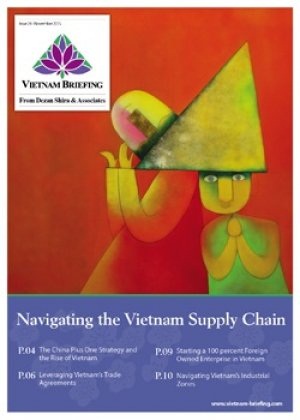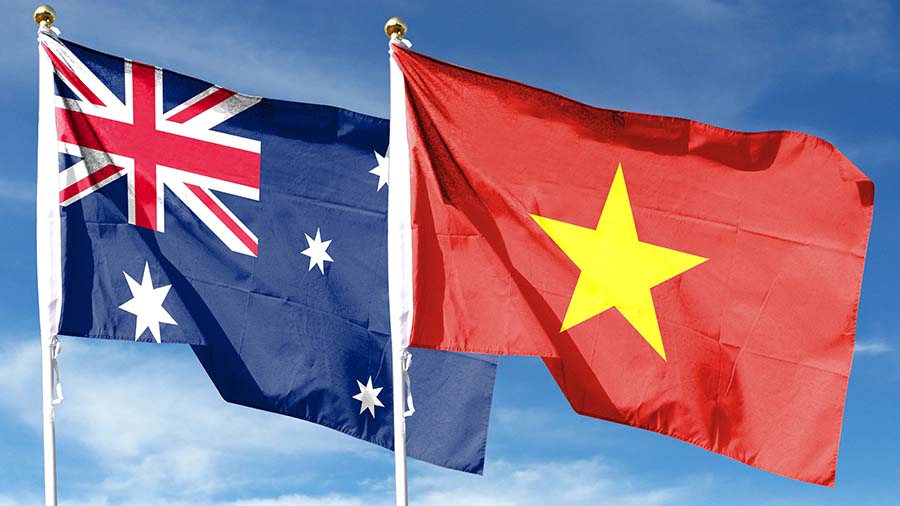Industry Spotlight: Vietnam’s Growing Appetite for Education
 By: Dezan Shira & Associates
By: Dezan Shira & Associates
Editor: George Llewellyn-Jones
In 2016, prevailing societal values and strong economic tailwinds combine to create promising opportunities in Vietnam’s education sector. For those capable of navigating the bureaucratic hurdles of the Vietnamese Market, timing has never been better to establish operations.
Historically, education has been championed as part of Vietnam’s Confucian value system. Not only has this created a strong demand for education related services, it has also propelled the sector to the top of the government’s agenda, with education development listed among the top seven foreign investment promotion categories within the country. In addition to historical reverence, the skilling of workers is also seen by officials as the ticket to increasing national competitiveness and bolstering investment.
As increased trade, steady government policies, and strong economic growth continue, increasing disposable incomes are now enabling families to afford private tutoring outside of the unsatisfactory teaching quality in schools. As 42.1 percent of the population are aged between 0-24 years, the window of opportunity for foreign investors cannot be overstated.
 RELATED: Dezan Shira & Associates’ Corporate Establishment Services
RELATED: Dezan Shira & Associates’ Corporate Establishment Services
Demographic Opportunities
On an individual level, economic modernization has resulted in significant changes in the demand for labor within the Vietnamese economy. A job market that once focused on agriculture has subsequently migrated to manufacturing and will likely see pulls towards services in the near to medium term. Many parents are therefore seeking to enhance their children’s education so they may obtain skills which meet the ever increasing demands of the labor market.
Following in the footsteps of countries such as China and South Korea, parents in Vietnam increasingly see foreign universities as the most effective means of obtaining a leg up for their children. In 2015 alone nearly 110,000 Vietnamese students studied abroad at a cost US $3 billion. With income levels rising at record levels, this trend is set to continue and will likely fuel demand for services intended to prepare students for relevant entrance requirements.
In this regard, data from the World Bank shows that around 27 percent of households in Vietnam send their children to private lessons and the majority of them (90 percent) spend between one percent and five percent of household expenditures on supplementary lessons. Wealthier families in major cities such as Hanoi and Ho Chi Minh City are where the biggest demand is found, although a number of private tutoring centers have cropped up and sustained profitability in smaller cities including Hai Phong, Bien Hoa, and Da Nang.
The State of Foreign Direct Investment in Education
Out of all the skills required for university entrance exams, the most pertinent and requested are for languages. The main languages sought after are English, Chinese, Japanese, and French, with English in particular being highly regarded. Not only does English make up more than half of the US $198.7 billion global private language education market, the vietnamese government has set an ambitious target for all graduates to have a good grasp of English by 2020. Unfortunately, poor teaching quality remains rife in public schools and is resulting in growing dissatisfaction with conventional education institutions
As the demand continues to grow and remains unserviced by the public sector, opportunities for foreign investment abound. As of May 2015, there have been 213 FDI projects in the field of education, with total registered capital of US $822 million according to the Foreign Investment Agency (FIA). The majority of these investment have been in private english language centers that aim to prepare students for rigorous language exams such as the TOFEL.
Current competitors in the language prep market include Apollo, ILA, and VUS (Vietnam USA Society). VUS has 15 centers in Ho Chi Minh City, and Apollo and ILA operate across Vietnam with 18 and 31 centers, respectively. As one of the first foreign entrants to the Vietnamese education market, Apollo was the first company to take advantage of becoming a 100 percent foreign-invested education entity.
Apollo and ILA have both employed long term investment strategies which emphasise the importance of giving students a sense of achievement from each lesson. Apollo ensures this by focusing on having strong teacher training systems. Learning environments are of high quality too with all classrooms having air-conditioning and good lighting. Apollo initially established a small centre to better understand the market and then used their experience to set up eight centres in larger cities. Alongside these nationwide brands, there are many independent language schools operating throughout the country.
 RELATED: Industry Spotlight – Emerging Opportunities in Vietnamese Healthcare
RELATED: Industry Spotlight – Emerging Opportunities in Vietnamese Healthcare
Common Investment Vehicles
As stated above, language tuition centers remain the primary means investment within Vietnamese language education. This is in large due to investment restrictions that have been placed the education sector. Currently, foreign capital is limited to a 20 percent share in all projects relating to the provision of a fully private education experience. Although offering a replacement for public education institutions remains limited, supplemental education, foreign language centers and pre-univeristy prep program included, remains open to 100 percent foreign ownership and is thus primed for investment.
For those considering investment, pre-university language schools and education providers are able to operate under the following structures:
- A 100 Percent Foreign Owned Investment – Since 2009, 100 percent foreign ownership of language centers has been permitted, allowing investors to act under the same conditions as domestic enterprises.
- Joint Ventures (JV) – These will have at least one foreign and one Vietnamese investor and can operate with a majority foreign share.
- Business Cooperation Contracts (BCC) – The most common form of foreign investment in education in Vietnam. Foreign firms will partner with a Vietnamese investor without the creation of a new entity such as a JV or 100 percent FOI. Under this model, foreign and local education institutions will usually conduct twinning programs, offer training courses, and/or exchange programs.
- Representative Office – These are usually set up to investigate the market in-depth. Their activities are restricted and establishment can be difficult but it allows for local relationships to be built.
Tax Incentives
Socialized sectors in Vietnam, including education, will enjoy a preferential Corporate Income Tax rate of 10 percent. This allows for a substantial discount over the already competitive CIT rate of 20 percent that is normally levied.
Understanding the Challenges Ahead
Set up
Setting up as an education service provider can be a tedious process with a number of preconditions. The initial step is to obtain an Investment Certificate before any investments can begin. The government requires a minimum investment of VND 20 million per student (not including the land tenancy).
Once a location is chosen, facilities need to be set up before an application for an Educational Institution License can be submitted. Following the business’ registration, a corporate bank account should be opened to register for the tax code. Employees can then be hired and registered.
Human Resources Compliance
From an HR perspective, teachers must also meet certain requirements. They must have college degrees along with a TEFL certificate. Health and police checks are also required. Naturally, parents are particular about teachers and native speakers are usually preferred. Fortunately, there is an abundance of foreign teachers in Vietnam looking for work. The quantity of potential applicants enables schools to conduct face-to-face interviews with potential teachers.
All teachers may be employed on a probationary period, after which a work permit and a residence card should be applied for. The school must then collect Personal Income Tax (PIT) from the employee.
Optimizing Investments
While the bureaucracy may seem daunting, many foreign-owned schools have been successful due to their emphasis on facilities, pricing, and targeted markets. Confidence should therefore be instilled by promoting a strong and responsible brand that meets the expectations of parents.
In addition to this, investors should strive to maintain a firm understanding of the latest setup and compliance procedures in order to ensure that operations can be established and run smoothly.
|
Asia Briefing Ltd. is a subsidiary of Dezan Shira & Associates. Dezan Shira is a specialist foreign direct investment practice, providing corporate establishment, business advisory, tax advisory and compliance, accounting, payroll, due diligence and financial review services to multinationals investing in China, Hong Kong, India, Vietnam, Singapore and the rest of ASEAN. For further information, please email vietnam@dezshira.com or visit www.dezshira.com. Stay up to date with the latest business and investment trends in Asia by subscribing to our complimentary update service featuring news, commentary and regulatory insight. |

Annual Audit and Compliance in Vietnam 2016
In this issue of Vietnam Briefing, we address pressing changes to audit procedures in 2016, and provide guidance on how to ensure that compliance tasks are completed in an efficient and effective manner. We highlight the continued convergence of VAS with IFRS, discuss the emergence of e-filing, and provide step-by-step instructions on audit and compliance procedures for Foreign Owned Enterprises (FOEs) as well as Representative Offices (ROs).
 Navigating the Vietnam Supply Chain
Navigating the Vietnam Supply Chain
In this edition of Vietnam Briefing, we discuss the advantages of the Vietnamese market over its regional competition and highlight where and how to implement successful investment projects. We examine tariff reduction schedules within the ACFTA and TPP, highlight considerations with regard to rules of origin, and outline the benefits of investing in Vietnam’s growing economic zones. Finally, we provide expert insight into the issues surrounding the creation of 100 percent Foreign Owned Enterprise in Vietnam.
 Tax, Accounting and Audit in Vietnam 2016 (2nd Edition)
Tax, Accounting and Audit in Vietnam 2016 (2nd Edition)
This edition of Tax, Accounting, and Audit in Vietnam, updated for 2016, offers a comprehensive overview of the major taxes foreign investors are likely to encounter when establishing or operating a business in Vietnam, as well as other tax-relevant obligations. This concise, detailed, yet pragmatic guide is ideal for CFOs, compliance officers and heads of accounting who must navigate Vietnam’s complex tax and accounting landscape in order to effectively manage and strategically plan their Vietnam operations.
- Previous Article Tax Alert: Vietnam Amends Laws on Tax Administration, Special Consumption Tax, and VAT
- Next Article Vietnam Regulatory Brief: Timber Export Standards, Venture Capital Funding, and Proposed Increases to Business Licensing Fees
































